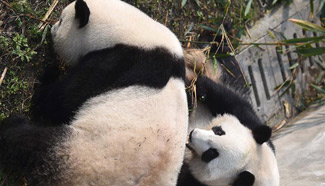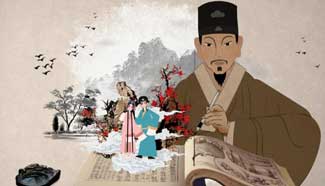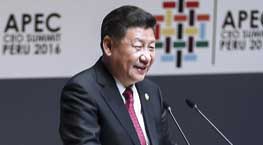BEIJING, Dec. 6 (Xinhua) -- The traditional Chinese medicine (TCM)industry is facing a dilemma. Should it replace tiger bones and rhino horns in its medicine to please animal-rights activists at the cost of reducing potential healing effects?
China issued its first white paper on TCM Tuesday, highlighting both the development of the modern TCM pharmaceutical industry and the traditional roots of ancient therapies.
Animal-rights activists have long raised questions on TCM because many traditional formula contain animal parts or elements extracted from them.
Zheng Jin, head of the Yunnan provincial TCM administration, said with rising public awareness on animal protection, the TCM industry is promoting the use of substitutes for wild animal parts.
There are generally two ways for making substitutes of animal products in TCM -- finding alternative, more acceptable animals or artificial synthesis, Zheng said.
In January, the scientific development of synthetic muskone to replace that extracted from musk deer won first prize at the China National Science and Technology Progress Awards. The element is widely used in TCM drugs to help blood circulation and treat minor strokes.
Zheng said a number of companies in Yunnan are conducting experiments in raising rhinos, as rhino horns are one of the components in both TCM and medicine in countries in the Middle East and Asia. It is said to have effects treating typhus and snake poison.
Zheng said by artificial feeding, the companies gather rhino horn like "trimming a finger nail," with the horns regenerating.
Feng Ming, vice president of Shanxi University of Traditional Chinese Medicine, said it is not new for people to oppose using rare animals in TCM remedies.
"As early as the Tang Dynasty (618 - 907), Sun Simiao, known as the King of Medicine in China, was against the use of animal parts," he said.
In Sun's book, he said Chinese Medicine was aimed at saving people. "How could we do so at the expense of animals' lives?"
It is now common among TCM doctors to replace rhino horn with buffalo horn, as well as using two other ingredients to replace bear gall. But many TCM doctors say such replacements undermine the effectiveness of the medicine.
Lin Yanfang, chief expert of Dai ethnic minority TCM in southwest China's Yunnan, said that both mainstream TCM and traditional therapy used by people of Chinese ethnic minority groups have traditional recipes noting the importance of animal parts.
"Traditional formulas say gall bladder from a wild bull has detoxifying functions, which can be used for treating therioma. However, wild oxen have become endangered. We have tried to extract gall from water buffalo," Lin said.
But the medicine composed from water buffalo has proved less effective than that from wild bull.
"Sometimes we are confused which should come first. Animals or patients?" Lin said.
A Chinese bear bile company has quit its IPO bid twice after animal-rights activists waged a media war condemning it for raising bears and extracting bile from their gall bladders.
Fujian Guizhentang Pharmaceutical based in southeast China's Fujian Province has stuck to the use of bear bile in making traditional medicine.
Qiu Liping, chair of the company, on Tuesday declined Xinhua's interview request.
The company has its own bear farm for the extraction of bile from live caged bears via catheters in their bodies. The practice is considered cruel and painful.
Despite the uproar, the company insists that tonics produced with bear bile ensure the medicine works according to the traditional recipe.
Although TCM was developed in the daily lives of the Chinese people in their fight against diseases, it has been widely accepted as a medical science.
Yang Jukui, retired head of a Shanxi TCM factory, noted that China is lagging behind Japan and Germany in TCM pharmacological studies and techniques to extract effective components.
"The pharmacological basis of many traditional formulas remain unknown. Some ingredients have different effects if handled in different ways and temperatures, but no one knows why," he said.
Beijing Tongrentang (Group), one of China's most prestigious TCM pharmacies, said it has set up 130 overseas subsidiaries in 25 countries and regions since 1993.
Tian Ruihua, chief engineer of the company, told Xinhua on Tuesday that 60 of the overseas stores have TCM doctors. More than 30 million people have received TCM formula drugs, therapy or medical consultations via Tongrentang stores.
Many Tongrentang medicines use synthetics to replace animal elements, including tiger bones and musk.
"The technology for making artificial substitutes is now very mature. The substitutes provide a good supplement," Tian said. "However, as TCM culture is getting more and more popular in the West, Tongrentang as a century-old TCM pharmacy aims to return to the traditional TCM methods to preserve the essence of ancient therapy."










